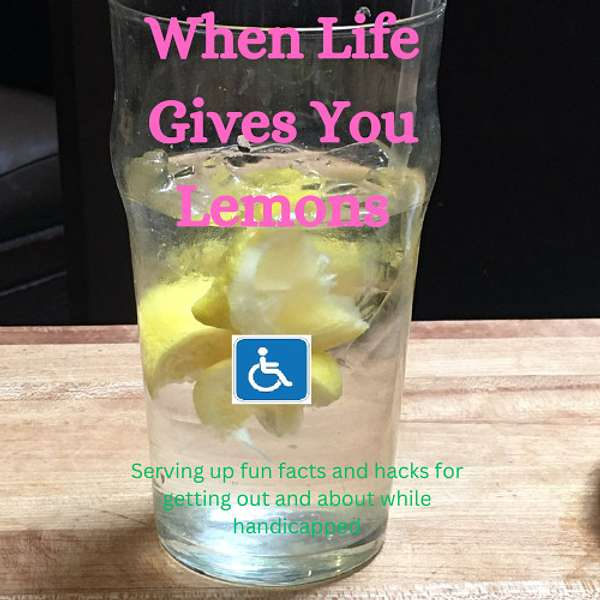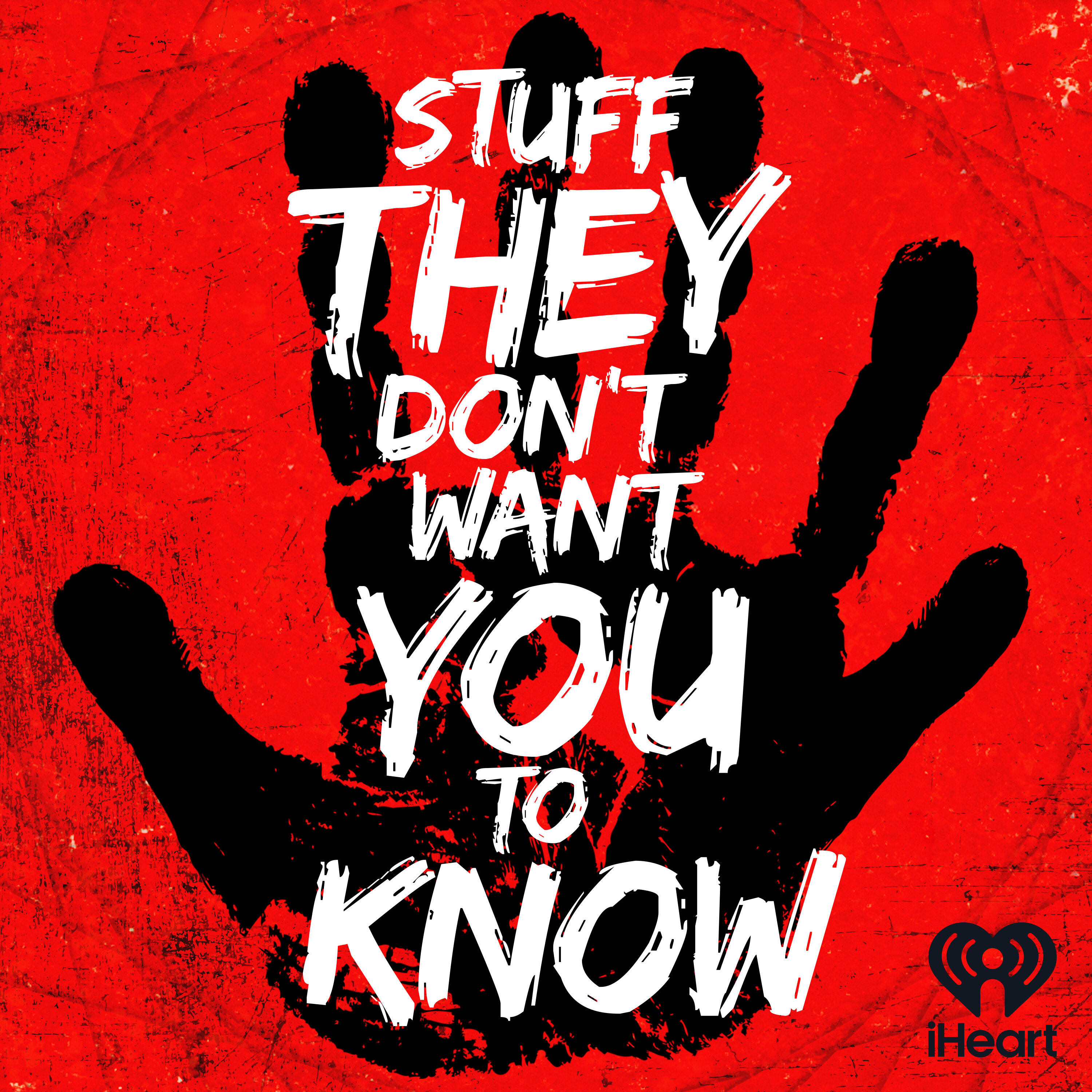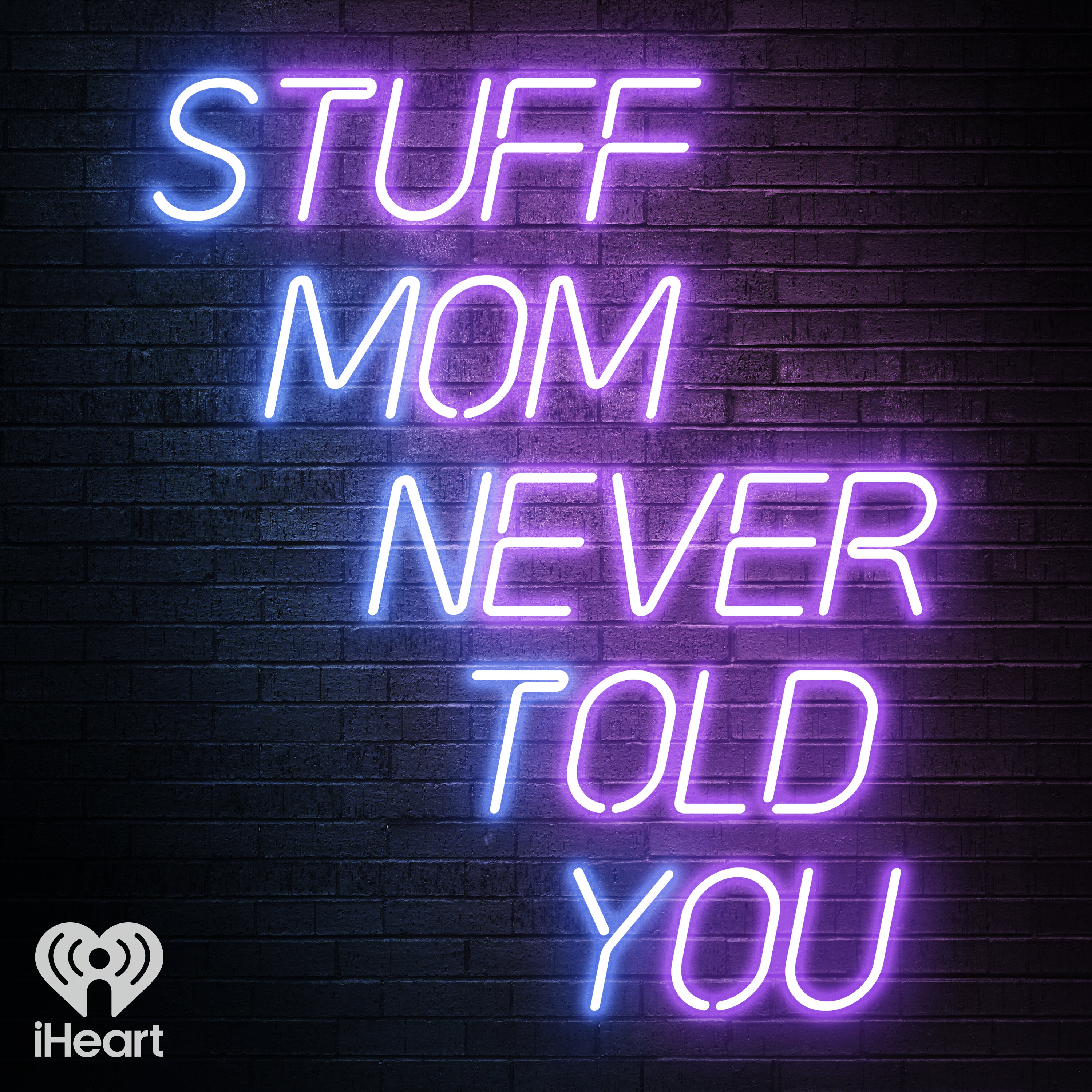
When Life Gives You Lemons
We do a bit of Research into handicapped travel issues and provide some solutions. Mobility, Hearing, Sight, Mental issues included. so far our episodes have included some information on Ataxia, Cerebral Palsy, Deafness, Dancing Sickness, Gulf War Syndrome, Long Covid and Wheelchairs. We are both Disability Advocates and realize there are too many diseases and conditions to cover and try to discuss the most common problems disabled people face and spread some awareness of disabled issues non-disabled people are unaware of.
CORRECTION
On a Previous episode I described how to enter our End Of Season contest. Step 1 click on the support our show link. Step 1 we require a one time payment (This has changed during our season) of $3. Step 3 (get you back to a one time payment) click on the $3 Subscription button. The following business day cancel the subscription (if you do it same day your bank may start thinking FRAUD. Step 4 Your done. Thanks for entering and "may the odds be forever in your favor",
When Life Gives You Lemons
Alexa, Tell Me Why My Robot Bed Wants to Kill Me
The line between medical innovation and science fiction gets blurrier every day, but when does hopeful technology cross into dangerous misinformation? Kevin and Palmy tackle the controversial topic of "med beds," separating legitimate medical advances from conspiracy theories.
We explore how smart medical beds with voice activation and vital monitoring capabilities represent real technological progress in healthcare settings. These innovations could help address nursing shortages by automating routine tasks and improving patient experiences. Yet simultaneously, unfounded claims about miracle "med beds" that supposedly cure all diseases, regenerate limbs, and reverse aging have spread through certain online communities despite lacking scientific evidence.
The conversation shifts to broader concerns about technology in healthcare, particularly privacy issues as beds become more integrated with AI systems. Drawing parallels to home voice assistants like Alexa and Google Assistant, we discuss the benefits these technologies offer people with disabilities while acknowledging legitimate questions about data security. Kevin shares his personal challenges with voice recognition as his speech has changed, highlighting how accessibility needs evolve over time.
As disability advocates, we emphasize the importance of approaching health-related claims with critical thinking, especially those promising miracle cures without scientific backing. Remember our unofficial slogan: "being disabled is expensive" - a reality many in our community face when navigating both legitimate and questionable medical technologies. Want to support our work? Visit our website to make a contribution or, if you're local, try Palmy's fresh sourdough bread with home delivery available!
Soundstripe.
Kevin:Welcome to our podcast. When life gets you lemons, I'm Kevin and I'm Palmy.
Palmi:We consider ourselves disability advocates and intend to spotlight some disability issues and things we find interesting that we frequently encounter when we're out and about. Also some history on disability that we find interesting.
Kevin:Well, hello everybody. Welcome back to our podcast. When Life Gives you Lemons, I'm Kevin.
Palmi:I'm Palmy.
Kevin:Of course you are you, and our talk today is going to be med beds, and, right off the top, we want to bust a couple myths and talk about how there is a difference between a med bed and a conspiracy theory surrounding the med beds.
Palmi:Well, we need to clarify. There's two different beds. There's two. Well, we need to clarify. There's two different things. There's a med bed, which people get confused, and then there's an advanced bed advanced medical bed, right.
Kevin:Right yeah, smart bed.
Palmi:Smart bed. Yeah, so what? There's a controversy about the med bed. It's a very controversial topic and it claims the claim for the med bed, which is what we're talking about right now, is that it has secret healing devices lacking scientific evidence, often linked to conspiracy theories. Evidence often linked to conspiracy theories. Legitimate smart medical beds do exist and are designed to assist patients in hospitals, with practical features like voice control and medical tracking and tracking of their vitals and that kind of thing. So there is an extreme difference between the two, right?
Kevin:Correct, basically med beds. Conspiracy theory-wise is like there are beds out there that are more based on the beds you see in futuristic science fiction movies the heel bones, they regenerate tissue, et cetera and that is a little bit beyond our medical capability right now. But, as Pommy said, getting assistance, for example, with the nurse call button can be voice activated on a smart bed.
Palmi:Right. So the conspiracy theory claims. Some believe the medical beds are secret devices capable of curing any diseases, regenerating the limbs and reversing aging. These claims, popular in far-right and QAnon communities, lack scientific backing and are considered companies like Pseudoscience.
Kevin:Pseudoscience, sorry, not psychoscience.
Palmi:Well, yeah, there you go. Companies like Tesla BioHealing sell devices claiming to emanate life force energy for healing, but they have come with disclaimers and have faced criticism from the FDA for unproven claims about treating serious illnesses like cancer and Alzheimer's. The concept, like you said, is rooted in science fiction, like the movie Prometheus. Have you seen that movie? Did I see it? Apparently not Well, I wouldn't have remembered it. I probably saw it with you if I saw it. What is it about? Apparently not Well, I wouldn't have remembered it. I probably saw it with you if I saw it.
Kevin:What is it about? It's like an interstellar mission where everybody goes crazy.
Palmi:From aliens or something.
Kevin:No.
Palmi:Oh, just from.
Kevin:Space. No contact with the outside world.
Palmi:And these med beds, fix everybody or no Kind of Kind of you put them, these med beds, fix everybody, or no? Oh, they do Kind of Kind of. You put them in the beds and it fixes everybody. So that's the concept.
Kevin:Well, prometheus walks a fine line where people are descending into madness, so you're never quite sure what there is madness when they watch something happen or whether or not it's really happening.
Palmi:Okay, sounds like something I would have been scrolling during, yeah. One of your movies, apparently.
Kevin:Pretty sure that's what you would have been doing.
Palmi:And it has spread through online misinformation, with social media posts prompting medical beds as real despite no evidence. This has led to a divide between believers and skeptics, with scientists leading towards dismissing the conspiracy claims as unfounded. The conspiracy claims as unfounded Medical beds have emerged as a topic of significant interest, particularly on online communities, about the legitimacy of promising miracle healing and legitimate medical technology. There was an overview and a recent discussion and scientific research done as of July 2025 to address the complexity of the surrounding the medical beds, so it is something that they're looking into. I mean, I imagine, with the shortage of nursing staff and stuff, the smart beds are really something that would be useful in a hospital situation.
Kevin:I would think so, because obviously they're automating some of their routine tasks, Right Well?
Palmi:just think, when we were there with your mom at the, she had a episode where she was in the hospital and, um, they had a tech that came in what every two hours or so and took her vitals. If you could eliminate I know that's eliminating staff and so that maybe wouldn't be the best thing, but, um, yes, it was a CA probably that walked around and was taking vitals every two hours. If you could eliminate that by having a SPART bed if you didn't have the staff to cover that, that seems like that would be an advantage for the hospital.
Palmi:Yeah, I mean you still have to have somebody to manage, watch the numbers and stuff like that. I'm sure the disadvantage to that would be expense of the smart beds, yeah there'd be one huge expense in the beginning, but I think overall to the hospital's advantage.
Kevin:Eventually the huge cost goes down. Advantage eventually the huge cost goes down. Like if you look at the uh manufacturing of the next generation fodders our government bought. They started out really, really pricey and they're still not cheap, but they're like about half the cost they used to be right because you know the factories that make them and the they're beyond the design and you know proving their proof of concept point of view. They can actually make money selling them and they want to remain competitive so they don't want to price themselves off the market, so to speak.
Palmi:Right, right, as long as they're not making outlandish claims like they're a miracle killer, they're curing stuff or anything like that.
Kevin:But us in the disabled community? Do you know they're going to want to take us for everything they can get.
Palmi:Yeah Well, I mean it's expensive to be disabled. We have that disclaimer everywhere, you know. So we need to put a bumper sticker out there.
Kevin:So we need to put a bumper sticker out there. We need to monetize this by making a T-shirt that says being disabled is so expensive. It's just selling it there you go.
Palmi:That's a thought, so I don't know what do you think? Have you heard much You're on the Internet a lot. Have you heard much stuff about're on the internet a lot? Have you heard much stuff about the MedBed actually curing people? I mean, you're into that Tesla stuff. So what have you heard out there on the interweb?
Kevin:Okay, tesla rarely has anything to do with the medicine. So if you're looking at the new Tesla wheelchair, it doesn't exist, it's just a. You have to understand. It's basically sour grapes and politics moved a lot of companies out of California to Texas, became a Republican as opposed to being a Democrat when he's in California, and there's lots of great people that use AI to make false claims about stuff. Either he's's evolving or Tesla is evolving.
Palmi:So I'm sorry, I'm confused. Is BioHealing a company, or is it not?
Kevin:I don't know. I noticed there were several companies that kind of did what he was doing with Neuralink. Oh, okay, but Neuralink.
Palmi:Oh, okay, but Neuralink is a real. We were talking about that.
Kevin:Neuralink is real.
Palmi:Okay, but you're not sure about the biohealing, the bed.
Kevin:You didn't research that the bed part no doesn't exist.
Palmi:The healing med bed doesn't exist from Tesla, it's the pseudoscience.
Kevin:The smart bed, that may help. It's like, instead of a nurse call button, a voice activated call their nurse. Or if you control the TV, either bed basically change channels, volume up, volume down, power, that kind of stuff. Basically, what they're doing with real smart beds is taking stuff that was wired into your bed in the hospital and make it wire-free so you don't have to like find the right device, which always seems to be a challenge when you're in the hospital.
Palmi:So it's voice activated versus finding a button, correct, but it's not hooked to vitals or anything like that yet.
Kevin:Yet that's the plan. The plan is yeah, I think that's. The next thing to come is the ability to do some vitals. Then, eventually, the ability to do all vitals, like blood draws and all this stuff. I think they're not to the point of conceptualizing like things that draw flows out of your body to do like a blood draw or whatever, but they are like it that they can do like carry your heartbeat, take your blood pressure, stuff like that. It's less invasive. Does that make sense?
Palmi:Yeah, I mean that's, it seems, and the only thing something like that worries me, as you always think about, I mean that's AI. I mean, more and more stuff is being taken over by AI, you know, and pretty soon the robots are going to take over.
Kevin:Yeah, but our robot overlords don't want to put us in hospitals, they'll just outright kill us, is that?
Palmi:what you think. Yeah, I can see a bed going up and down, up and down, up and down, up and down In torture mode or something. Or calling the nurse continuously. I'm thinking of all the awful stuff that could happen, or the Wi-Fi goes out. How many times does the Wi-Fi go out?
Kevin:Or it just plays with their TV channels there you go. I don't want to watch the home shopping network 24-7, yeah. The food Network? No, go away. I'm so steamy fasting I don't want to watch the Food Network.
Palmi:That was your mom, when she was in the hospital. She couldn't eat, but all she wanted to watch was the Food Network. It seemed like torture to us, but she was enjoying it, okay.
Kevin:So where did we get this topic from? This topic was actually suggested to us from the accessory go website or not. There was right there, uh.
Palmi:Community channel on the circle network boy, they're getting quite a few topics in there. Yeah, our listeners are going to have to start stepping up to beat them on their entries.
Kevin:Well, it's actually from the same guy.
Palmi:Oh, really, oh okay.
Kevin:So, but more to your point, yes, everyone else is slacking off, but the accessible goes circle to BJD.
Palmi:Except for one guy.
Palmi:Yeah one guy. Well, it was very interesting. I never heard of it. We'll do a conclusion and recommendation so as of July 27, 2025,. The evidence leads towards dismissing the controversial theory version of med beds as unfounded, with scientific consensus highlighting their lack of proof. Legitimate smart beds medical beds, however, offer practical benefits for health care, focusing on patient and nurse support. Given the controversy, it's advisable to rely on credible sources like peer review, research and regulated bodies for health-related discussions, and to approach online claims with skepticism, especially with those promising miracle cures without scientific backing. For further reading, you can look at Wikipedia under MedBeds, and that's where we found a lot of our information. Do we?
Kevin:have anything else to talk about, Kevin. I think we need to address the cultural and social context.
Palmi:Okay.
Kevin:Which is basically misinformation. As we talked about with smart beds, they're just after medical data, avoids control over routine things, etc. But when you talk about you know the future smart beds or the pseudoscience of bed beds, yeah, it can send you a non-halal meal. When you want halal or non-kosher, you want kosher, you want the beef, but they send you the fish. There you go. That's for us every day. Just gripe about stuff, not cultural, and there are things like social context. Social context they use defamatory language when they know nobody else, but you is in the room.
Palmi:The bed does.
Kevin:I'm just going to go out, I'll land here. Okay to go out and stuff Like addressing you, as you know, say Kevin Henry, eventually would probably be beneficial if they're able to communicate wirelessly with a server where your medical information is stored and if they ever get to the point where they're getting some of the say, a little bit more invasive blood pressure blood draws you can actually draw. For a lot of times recently I think with both of us, they've taken our blood sugar either prior to a procedure You're saying trying to keep it private versus going to some anonymous source, Right?
Palmi:So kind of like Alexa. Alexa hears everything and we're not sure where all the conversations that we have in the house goes to. Who's listening to it Exactly and who's getting that information?
Kevin:Yeah, Again you'd have a little bit of privacy concern between you and your visitors. Exactly what's being recorded.
Palmi:I see what you're saying, yeah, yeah, some people have a problem with that. We have Alexa throughout our house. We find Kevin can't turn on and off lights and so we find, of course, alexa is having trouble understanding him at this point, so I don't know that's helping as much at this point anyhow, but she turns on the lights when she can understand him. He'll have to say it a couple times, but usually he can get her to do it eventually. But we have that in the house and I find it very useful for adding stuff to my shopping list turning on music throughout the house, that kind of thing. But some people really have an issue with it that would not have it in their house because she does. Whoever does hear conversations throughout our house, but we don't say anything controversial. If they're excited about the boring life that we have, then good luck with them. Exactly, we would bore them to death.
Kevin:The only thing that's really weird, that happens with us with our Alexa devices, is we have three devices. They're all named different things. One is Alexa, don't be telling people our names of three devices.
Palmi:They're all named different things. One is Alexa. Don't be telling people our names of our devices.
Kevin:Okay, again, we're worried. I don't think anyone's going to hack into our devices just to hear what it's saying.
Palmi:It's just not smart.
Kevin:Okay, anyway, there'll be either a program on TV I don't know, it's just not smart. Okay, anyway, there'll be either a program on TV or a commercial that uses one of their names.
Palmi:They will respond to it by doing what they're saying, doing whatever the TV says, yeah.
Kevin:So fortunately we don't have a smart house. Alexa doesn't control very much, but our lights.
Palmi:I'd like to get one to control our thermostat.
Kevin:Yeah, I'm going to say no on Alexa. Let's go Google.
Palmi:Yeah.
Kevin:Because Google actually did a study on non-normal speech.
Palmi:Oh, really From corporate. I remember I was doing that.
Kevin:They give you text to read and you'd read the text and they'd see what it sounded like.
Palmi:You think Google would understand you better?
Kevin:Yes, I do. There are times when Alexa won't even turn on when I say, alexa, yeah.
Palmi:Your voice has changed so much. I think she needs to learn that your voice has changed.
Kevin:Alexa doesn't learn the voice, but I think Google might, or they might have it hardwired in by default, or something like that.
Palmi:Okay, we can try it.
Kevin:I know that, like on your phone, do you use.
Palmi:Siri. Yeah, I don't have a choice. That's what Apple has.
Kevin:I've never tried to use Siri, but on mine I have a Google Assistant which you activate by saying hey, google, and that works Really.
Palmi:That works better yeah.
Kevin:And the Alexa app I can't even get into, so I don't have great hopes for Alexa less.
Palmi:We'd have to reinvest in all the Alexas or to replace all the Alexas to Google's, though.
Kevin:We need to do that anyway. Some are old enough that I think that's part of the problem, like I'll say something you'll try to get it or it won't work for you either, but you have to say specific commands, like with the different lights.
Palmi:I made a mistake and said lamp versus light in some cases, and so you have to remember what you said. I think that's some of the issues Could be. Yeah, all right.
Kevin:Okay, could be. Yeah, all right, okay. So now we're going to get into some housekeeping. One of the ways that you can support us is financially, and what you do is go on our website, hit the support button and it will guide you through the rest.
Kevin:The program or app that we use to do that. We set it up had an option for a one-time only donation, but apparently the price of coffee has gone up because it's called Buy Me Coffee and you can no longer just buy us a coffee. You have to buy us a coffee every month.
Palmi:Oh really.
Kevin:I can explain to you how to bypass that. So you are making a one-time donation, but Just email, you then Email me if you're in that boat, I'll email you back, vicks, which I'm not sure would get anybody in trouble, but I prefer to keep that conversation between us two, not anybody who listens to the podcast, for all I know. I'll say something that could be used against me under trial, which is a whole lot easier to subpoena my podcast than subpoena my email.
Palmi:Another way if you're local. I have started a new sourdough company where I bake sourdough loaves and different stuff. I've started showing up at a local business on the weekends. So if you're looking to buy some sourdough and you're local, give me a call or email me. You can do it through the email site and Kevin will let me know if you have an order.
Kevin:You can use email or fan mail. I believe also we list Plum's email.
Palmi:Do you?
Kevin:Directly under our contributor's page.
Palmi:Yep, if you're local and if you're within the Jackson or Fruitland area, I do deliver.
Kevin:Yeah, the really cool thing about that is there's no line of wait. You already ordered it.
Palmi:Yeah, it's made fresh for you.
Kevin:Yeah.
Palmi:We did a new one this week. It was Lemonade Cherry. How did it taste? Kev.
Kevin:It tasted really good it tasted a lot better than it sounded.
Palmi:Really, you didn't think it sounded good.
Kevin:I didn't think Lemonade Cherry would be a good flavor combination, but it turns out really well yeah.
Palmi:I thought it was really good. You had two pieces with lots of butter.
Kevin:Yeah.
Palmi:The lady that I took it from. She actually had lemon butter. I bet that would be really good too. On it. Add more of the lemon flavor to it. Yeah, it could be Anything else.
Kevin:Yeah, it could be Anything else On our Facebook page there is a pastor locating Kenya. He's looking for advice or support, not necessarily financial support. You have to talk directly to him to find out the best way you may be able to support him. He needs people that will work with the disabled people in his community and help them get jobs that they can work remotely.
Palmi:He has a problem with parking.
Kevin:This is a country that doesn't have anything like the ADA.
Palmi:So people can't go to jobs, so he's looking for remote workers, yeah they can't fit through doors.
Kevin:They don't have commuter programs for transportation. They don't have. I know this sounds like the Wild West in America, but because, for example, our handicap placards are all tied to our vehicle, we have to have a doctor's letter at the DV to get one. So it's like if the police really want to track down a disabled placard number, they can see which cards are extra too, and if it's not, that one you are in violation, not that they enforce it, but they don't really like to enforce that kind of stuff.
Palmi:So but this guy over there, they don't do anything in kenya, right they?
Kevin:don't even have anything beyond you can buy a placard.
Palmi:And these people are living in poverty and they need work.
Kevin:Yeah.
Palmi:So he's looking to provide work for these disabled individuals, and so I think he's looking for people to teach him computer skills, right?
Kevin:Most remote work I can think of involve computer skills.
Palmi:yes, so if you've got computer skills and you're willing to work with some disabled people via the computer, then you're who he's looking for.
Kevin:And you've got extra time. Exactly, or if you happen to have a bunch of wheelchairs in the warehouse somewhere you don't know what to do with. Shrey can fight you through this too, Just saying. He also has for example, I mentioned the handicap placards. He only has a few of those. He needs a few more, so more than like two people can use it in a day.
Palmi:Okay, all right. Well, that's our episode, then, and we will see you next time.
Kevin:And make sure you visit our website, wwwwhenlifegivesyoulemonsownwordnet. You can download this episode. Subscribing is I don't like that word. Subscribing implies you're buying something You're not really. All you're doing is signing up to the podcast, again free, and it will notify you when there's new one, or download it if you have your app set up that way and keep making the lemon lemonade. See you next time folks soundstripe till next episode. Take those lemons and make your own lemonade.
Podcasts we love
Check out these other fine podcasts recommended by us, not an algorithm.

When Life Gives You Lemons
Kevin & Palmi Henry
Stuff They Don't Want You To Know
iHeartPodcasts
Stuff Mom Never Told You
iHeartPodcasts
Stuff You Missed in History Class
iHeartPodcasts
Planet Money
NPR
Ridiculous History
iHeartPodcasts
The Way I Heard It with Mike Rowe
The Way I Heard It with Mike Rowe




